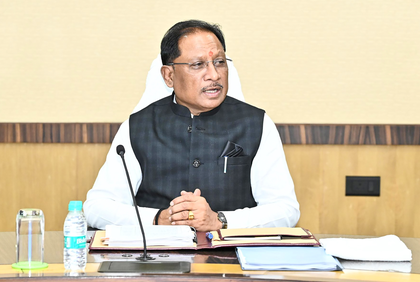Raipur likely to adopt Police Commissioner System from November 1
By IANS | Updated: September 14, 2025 13:00 IST2025-09-14T12:58:36+5:302025-09-14T13:00:10+5:30
Raipur, Sep 14 In a significant administrative overhaul, Raipur (Chhattisgarh) is set to implement the Police Commissioner System ...

Raipur likely to adopt Police Commissioner System from November 1
Raipur, Sep 14 In a significant administrative overhaul, Raipur (Chhattisgarh) is set to implement the Police Commissioner System starting November 1, signalling a transformative shift in how law and order will be managed in Chhattisgarh's capital.
The move, initiated by the state government, aims to modernise urban policing and streamline decision-making in response to growing metropolitan challenges.
Following official directives, Director General of Police (DGP) Arun Dev Gautam has issued orders to begin the transition from the traditional policing model to a commissionerate structure.
A seven-member committee, chaired by Additional Director General of Police (ADG) Pradeep Gupta, has been formed to study existing commissionerate frameworks in cities like Bhopal, Indore, Mumbai, and Delhi, sources have said. Their findings will inform a tailored proposal for Raipur, which will be submitted to the Home Department for final approval, they said.
Announcing the reform during the 79th Independence Day celebrations at the Police Parade Ground in Raipur, Chief Minister Vishnu Deo Sai had announced the implementation of the system and emphasised that the commissionerate system would strengthen law enforcement capabilities and improve public safety outcomes.
Already operational in several major Indian cities, the Police Commissioner System grants senior officers enhanced authority under the Code of Criminal Procedure. This includes the power to take direct action in matters of crime, public order, and emergencies - enabling faster response times, improved accountability, and more effective crime prevention.
Officials have indicated that the groundwork for the system in Raipur is nearly complete. Discussions around the model have been ongoing for years, but gained momentum after Chief Minister Vishnu Deo Sai's government assumed office.
The reform is expected to extend to other populous cities such as Bilaspur and Durg, where urban policing demands are similarly high.
Once implemented, the Police Commissioner will assume direct responsibility for law and order, with magisterial powers previously held by the District Collector.
The Collector's role will shift primarily to revenue and civil administration. To maintain effective coverage in non-urban areas, the government is considering appointing a separate Superintendent of Police (SP Rural), ensuring focused attention on both urban and rural policing needs, the sources said further.
This initiative reflects a broader national trend toward empowering police leadership in metropolitan regions.
Disclaimer: This post has been auto-published from an agency feed without any modifications to the text and has not been reviewed by an editor
Open in app